Simpling
Simpling is using single herbs alone. Some herbalists have a condescending attitude toward simpling, which is more associated with folk herbalism rather than academic or monastic herbalism, but simpling can be very effective. In European medieval times the art of growing and using herbs for medicine was called Simpling and the herbs themselves were called Simples.
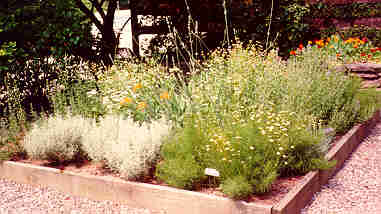 Today, simpling is often done by using an appropriate herb in large quantities where the synergistic aspects of blending herbs is eschewed for economic reasons or to make the therapy less complicated. Many herbs cannot be taken in large quantities, usually since the bitter or asringent properties upset the stomach when taken in large amounts. The ones Electroherbalism recommends for simpling can all be taken in large amounts, and typically have the effect of calming the stomach in increasing degrees the more is used.
Today, simpling is often done by using an appropriate herb in large quantities where the synergistic aspects of blending herbs is eschewed for economic reasons or to make the therapy less complicated. Many herbs cannot be taken in large quantities, usually since the bitter or asringent properties upset the stomach when taken in large amounts. The ones Electroherbalism recommends for simpling can all be taken in large amounts, and typically have the effect of calming the stomach in increasing degrees the more is used.
A good example of an appropriate condition for which to use simpling is IBS/Crohn's, an inflammatory bowel disorder, with fennel seeds. Fennel seeds can be chewed well in large amounts, but for bowel disorder, they are best ground - the seeds are pointy and can further irritate the digestive tract. Capsules or powder can be used. The method is to use as much as is needed until there are no longer any symptoms of the disorder. This may be anywhere from a quarter teaspoon up to two teaspoons of the herb powder (drink plenty of water with them) at a time.
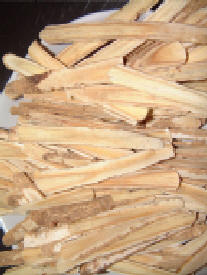 Another disorder that will respond to simpling with almost every herb recommended below except echinacea is acid indigestion, including chronic types such as GERD since most of these herbs are rich in alkaline minerals.
Another disorder that will respond to simpling with almost every herb recommended below except echinacea is acid indigestion, including chronic types such as GERD since most of these herbs are rich in alkaline minerals.
Astragalus root - Considered to stimulate immunity and cleansing at a deep level and although it is not considered a treatment for acute illness, is often used for influenza. It is more often recommended for chronic viral illness plus astragalus may help conventional antivirals work more effectively. Has the side benefit of calming the stomach, and it is used for general digestive disorders such as diarrhea, gas, and bloating. In China, it is used mostly for heart disease.
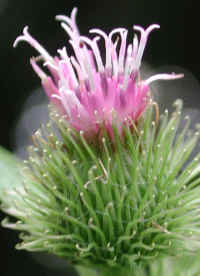 Burdock - Alterative (all-over cleanser, especially of the blood) also used for gentle stimulation of immune system to fight chronic infections, especially viral. However, it is more often used in skin disorders including eczema, psoriasis, and acne. Burdock is a principal ingredient of essiac tea. Calms stomach and relieves excess acid. Can be taken in very large doses if needed. Pleasant tasting and can be made into tea. The presence of high amounts of inulin and mucilage may explain burdock’s soothing effects on the skin and gastrointestinal tract. Inulin stimulates the growth of beneficial bacteria in the intestines, usually better than taking actual bacteria such as acidophilus. Bitter constituents in the root may also explain the traditional use of burdock to improve appetite and digestion. Usual dose 1/2 to 1 tsp or 2 to 4 capsules two or three times per day. Dose can be doubled, tripled, or simpled.
Burdock - Alterative (all-over cleanser, especially of the blood) also used for gentle stimulation of immune system to fight chronic infections, especially viral. However, it is more often used in skin disorders including eczema, psoriasis, and acne. Burdock is a principal ingredient of essiac tea. Calms stomach and relieves excess acid. Can be taken in very large doses if needed. Pleasant tasting and can be made into tea. The presence of high amounts of inulin and mucilage may explain burdock’s soothing effects on the skin and gastrointestinal tract. Inulin stimulates the growth of beneficial bacteria in the intestines, usually better than taking actual bacteria such as acidophilus. Bitter constituents in the root may also explain the traditional use of burdock to improve appetite and digestion. Usual dose 1/2 to 1 tsp or 2 to 4 capsules two or three times per day. Dose can be doubled, tripled, or simpled.
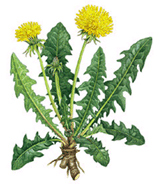 Dandelion - Root provides mild but effective cleansing of the liver as well as the kidneys and bladder. When used in sufficient amount, is an excellent diuretic and safe since it contains a good deal of potassium. Leaf is less often used. It has stronger action on the kidneys and less on the liver, but is an even better source of nutrients. Be sure to drink plenty of water when using either part. A good way to use it to make a large amount of weak tea and drink throughout the day instead of water. The principal constituents responsible for dandelion’s action on the digestive system and liver are sesquiterpene lactones that are unique to dandelion. Studies show dandelion to be a powerful diuretic. Dandelion's bitter compounds increase the gallbladder's production of bile. This improves liver function and the body's metabolism of fats. This, in turn, has the effect of stimulating digestion and appetite. Dandelion also acts as a mild laxative. Usual dose of root - 1/2 - 1 tsp (or 2 to 4 capsules) taken two or three times per day but can be taken in much larger amounts.
Dandelion - Root provides mild but effective cleansing of the liver as well as the kidneys and bladder. When used in sufficient amount, is an excellent diuretic and safe since it contains a good deal of potassium. Leaf is less often used. It has stronger action on the kidneys and less on the liver, but is an even better source of nutrients. Be sure to drink plenty of water when using either part. A good way to use it to make a large amount of weak tea and drink throughout the day instead of water. The principal constituents responsible for dandelion’s action on the digestive system and liver are sesquiterpene lactones that are unique to dandelion. Studies show dandelion to be a powerful diuretic. Dandelion's bitter compounds increase the gallbladder's production of bile. This improves liver function and the body's metabolism of fats. This, in turn, has the effect of stimulating digestion and appetite. Dandelion also acts as a mild laxative. Usual dose of root - 1/2 - 1 tsp (or 2 to 4 capsules) taken two or three times per day but can be taken in much larger amounts.
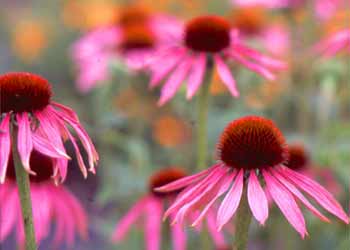 Echinacea - Premier immune stimulant and one of the most widely used herbs. Recommended for most bacterial and viral infections, acute and chronic. The two most common products available are echinacea purpurea aerial parts and echinacea angustofolia root. Purpurea may be better for fighting acute illness more quickly, but angustofolia root seems to better stimulate the immune system and clear lymphs nodes. Best method may be to use equal amounts of the two, and there are some commonly available supplements which provide this. The most common error is using too small a dose to be effective. An effective dose of echinacea root recommended by Michael Murray is 1-2g taken 3 times per day, assuming good quality with a typical profile of active ingredients. Not widely used for it, but good to heal the intestinal tract and is an excellent cleanser, especially of the lymphs. Stops enzymes from venom, bacteria, and viruses from destroying cells and tissue. When used for a cold, can start with a large dose at the onset (3g or more taken over a couple of hours) to stop virus from damaging cells. For a venomous snake or spider bite, VERY large doses (like 20g or more) should be used and as soon as possible (use in conjunction with very high dose vitamin C and, of course, also seek professional medical help immediately). Echinacea is usually a good antiinflammatory in cases of plain infection, but in chronic disorders caused or exacerbated by toxins it may actually cause inflammation, especially in blood type O's, and should be avoided. Usual dose - 1/2 to 1 tsp or 2 to 4 capsules taken two or three times per day may be doubled as needed.
Echinacea - Premier immune stimulant and one of the most widely used herbs. Recommended for most bacterial and viral infections, acute and chronic. The two most common products available are echinacea purpurea aerial parts and echinacea angustofolia root. Purpurea may be better for fighting acute illness more quickly, but angustofolia root seems to better stimulate the immune system and clear lymphs nodes. Best method may be to use equal amounts of the two, and there are some commonly available supplements which provide this. The most common error is using too small a dose to be effective. An effective dose of echinacea root recommended by Michael Murray is 1-2g taken 3 times per day, assuming good quality with a typical profile of active ingredients. Not widely used for it, but good to heal the intestinal tract and is an excellent cleanser, especially of the lymphs. Stops enzymes from venom, bacteria, and viruses from destroying cells and tissue. When used for a cold, can start with a large dose at the onset (3g or more taken over a couple of hours) to stop virus from damaging cells. For a venomous snake or spider bite, VERY large doses (like 20g or more) should be used and as soon as possible (use in conjunction with very high dose vitamin C and, of course, also seek professional medical help immediately). Echinacea is usually a good antiinflammatory in cases of plain infection, but in chronic disorders caused or exacerbated by toxins it may actually cause inflammation, especially in blood type O's, and should be avoided. Usual dose - 1/2 to 1 tsp or 2 to 4 capsules taken two or three times per day may be doubled as needed.
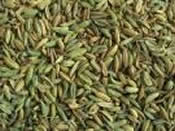 Fennel Seeds - One of the best herbs to fight gas, cramps, acid indigestion, and many other digestive tract maladies, chronic or acute. Used with turmeric, often provides quick and effective relief from many digestive disorders, even some chronic serious ones. Seeds taste like licorice when chewed. Rich in minerals including magnesium. Mild liver and urinary tract stimulant. Capsules of powder should be used for inflammatory digestive disorders like Crohn's or IBS in whatever amount is necessary to stop cramping and discomfort. Usual dose - 1/2 - 1 tsp seeds (chew well, or make into tea eating the soaked seeds) or two to four capsules two or three times per day. Can be used in very large amounts as needed.Weak, strained tea (remove the seeds) can be used for babies for
Fennel Seeds - One of the best herbs to fight gas, cramps, acid indigestion, and many other digestive tract maladies, chronic or acute. Used with turmeric, often provides quick and effective relief from many digestive disorders, even some chronic serious ones. Seeds taste like licorice when chewed. Rich in minerals including magnesium. Mild liver and urinary tract stimulant. Capsules of powder should be used for inflammatory digestive disorders like Crohn's or IBS in whatever amount is necessary to stop cramping and discomfort. Usual dose - 1/2 - 1 tsp seeds (chew well, or make into tea eating the soaked seeds) or two to four capsules two or three times per day. Can be used in very large amounts as needed.Weak, strained tea (remove the seeds) can be used for babies for  colic, cramping, gas, and other digestive problems and as a mild antiparasitic and liver cleanser.
colic, cramping, gas, and other digestive problems and as a mild antiparasitic and liver cleanser.
Marshmallow - Marshmallow root is an excellent stomach and intestinal mucilage and a gentle diuretic which helps against pain in the urinary tract, although it is most widely used for cough and sore throat remedies due to its soothing qualities. It is a primary ingredient in a product often recommended by Electroherbalism for kidney and liver problems - Planetary Formula's Stone Free. The plant's name comes from its favorite habitat - marshes and other damp environments. The scientific name is althea officinalis and one will often see it called this on supplement packages instead of its common name, perhaps so people don't think that they fluffy confection of the same name is included in the supplement.
 Slippery elm bark - One of the best intestinal healing herbs and mildly stimulates elimination when taken in sufficient dose. Has good action for many chronic and most acute intestinal disorders. It is mildly antiparasitic and antibacterial and also supports lung function. Can be used as a food if nothing else will stay down since it is so calming on the stomach and although starchy, it is nutritious, so can be life-saving in some cases. Absorbs a great deal of water and should be fully hydrated before eating the bulk powder, or plenty of water taken with capsules. Usual dose - 1 to 2 or more tablespoons (yes, tablespoons) of powder mixed in oatmeal, or by itself into a gruel with hot water, mixing a little honey and cinnamon if desired, and adding crushed fennel seeds or powder for more action if needed. Taking large quantities like this is most effective, but it also beneficial in smaller doses, like 1 teaspoon or 2 to 4 capsules or more taken two or more times per day.
Slippery elm bark - One of the best intestinal healing herbs and mildly stimulates elimination when taken in sufficient dose. Has good action for many chronic and most acute intestinal disorders. It is mildly antiparasitic and antibacterial and also supports lung function. Can be used as a food if nothing else will stay down since it is so calming on the stomach and although starchy, it is nutritious, so can be life-saving in some cases. Absorbs a great deal of water and should be fully hydrated before eating the bulk powder, or plenty of water taken with capsules. Usual dose - 1 to 2 or more tablespoons (yes, tablespoons) of powder mixed in oatmeal, or by itself into a gruel with hot water, mixing a little honey and cinnamon if desired, and adding crushed fennel seeds or powder for more action if needed. Taking large quantities like this is most effective, but it also beneficial in smaller doses, like 1 teaspoon or 2 to 4 capsules or more taken two or more times per day.
Good sources for quality bulk herbs are Bulk Apothecary and Starwest Botanicals.